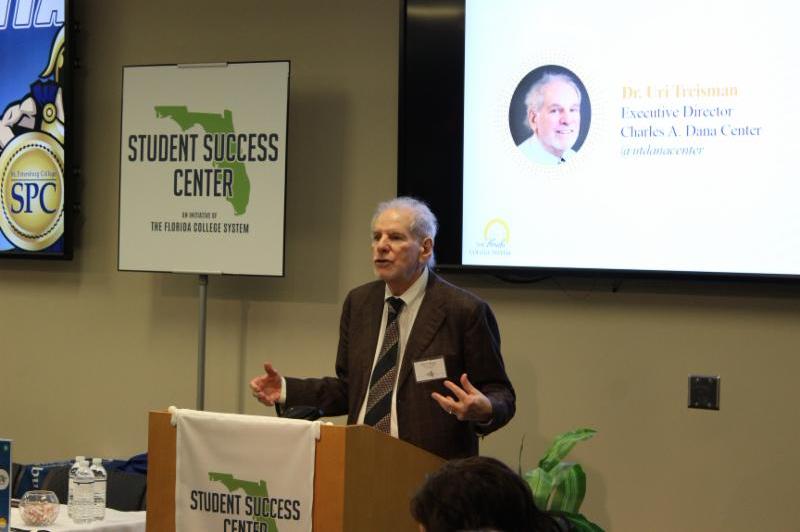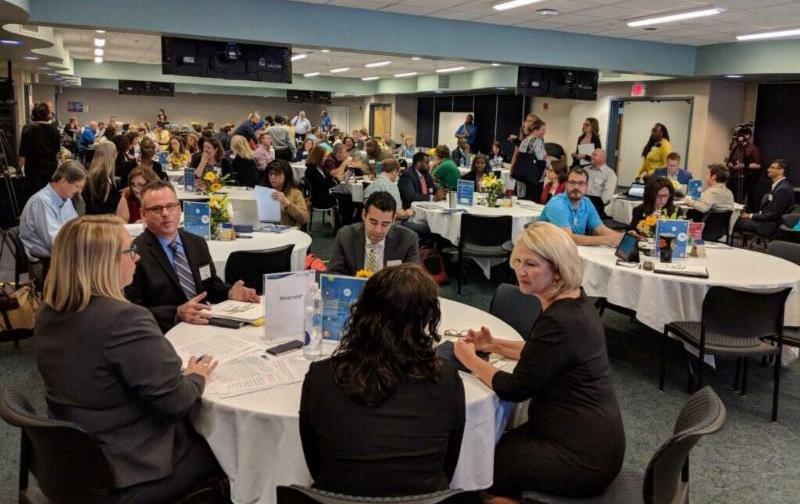|
|
|
Message from Chancellor Madeline Pumariega
|

This special edition newsletter focuses on mathematics pathways redesign in the Florida College System (FCS) - sharing data, information and outcomes from the 2018 Mathematics Pathways Convening. Hosted by the Florida Student Success Center and St. Petersburg College, more than 150 mathematics faculty, department chairs and key stakeholders from Florida's 28 colleges gathered on April 9 to review research related to mathematics pathways models and associated academic and student supports,
as well as share best practices and statewide mathematics pathway models.
Mathematics is an important and foundational subject. We are increasingly finding that mathematics has become a barrier to many postsecondary students. According to Advancing Mathematics Pathways for Student Success (AMPSS), a coalition of national higher education organizations and foundations, mathematics courses are "the most significant academic barrier to postsecondary attainment," with only 28 percent of community college students completing one gateway math course within their first two years. In Florida and across the nation, innovative approaches to redesigning developmental and entry-level mathematics courses have been developed, incorporating elements that include disaggregated pathways with targeted curricula for specific programs/disciplines; co-requisite remediation; focus on problem-solving rather than skill building; and new teaching methodologies.
The data are clear - only 57 percent of students pass Intermediate Algebra (MAT1033), leaving nearly half behind in their academic progress. While many of our colleges have made great strides in mathematics preparation and education, there is still more work to do to reduce barriers. As we build upon the best practice work in the mathematics field, as well as our students' success, understanding the need for mathematics pathways redesign is not only an academic and financial issue, but an equity issue as well. As we look forward, the formation of statewide mathematics workgroups
will help us collect evidence-based best practices designed for scale and develop recommendations for state policy and institutional policy and practice around mathematics redesign.
I look forward to your engagement in this work.
Madeline Pumariega
Chancellor
|
|
|
|
National Perspective: Mathematics Pathways to College Completion and Equity
|

Dr. Uri Triesman, executive director of the Charles A. Dana Center, opened the convening with the national perspective on mathematics pathways to college completion. In the last two years, there have been many structural changes in postsecondary education, including shifting from prerequisite to co-requisite models in developmental education, moving from adopting pilots to making change at scale, and reforming course sequences, instead of just courses, to ensure students are making informed choices
. In addition to lifting up academic tutors, Dr. Triesman spoke of the need for system-based design to allow for seamless transfer, as well as the need for high-quality data to inform the work.
Equity is an important consideration to any discussion about mathematics redesign. In reflecting on institutional data, Cuyamaca College in California changed mathematics placement policies to include tests and other measures, eliminated all classes below Intermediate Algebra and designed concurrent enrollment support courses. Dr. Tammi Marshall, chair of the mathematics department at Cuyamaca College, shared data that showed students who previously would have been placed in a course below gateway, but were now allowed to take a transfer course with co-requisite support, showed high rates of success across all demographics. These results supported the belief that all students have the capacity to do college-level work and benefit from additional support.
|
 |
 |
|
Best Practices of Mathematics Redesign in the Florida College System
|

To share evidence-based best practices in the FCS, Dr. Jesse Coraggio, Vice President of Institutional Effectiveness and Academic Services at St. Petersburg College, moderated a panel of mathematics faculty and department chairs to share their colleges' efforts and successes around mathematics redesign. Panel members included Marc Campbell, Mathematics Department Chair at Daytona State College, Dr. Bobbi Parino Cook, Professor of Mathematics at Indian River State College and Natalie Souders, Mathematics Professor at Lake-Sumter State College.
Indian River State College redesigned mathematics courses through the Mathematics at the Root of Success initiative, employing an emporium model, standardizing curriculum and re-tooling student services to direct students into the appropriate courses. The results are promising; gateway mathematics success rates and success rates in subsequent mathematics courses improved. Lake-Sumter State College also redesigned mathematics using an emporium model. Leveraging technology resources from Title III, faculty connected with students to identify their individual needs. Lastly, recognizing that textbook costs create barriers, more than half of the mathematics at Daytona State College created a book - at no cost to the student - through the Learning Management System.
|
 |
 |
 To elevate the work of our colleges and continue the conversation regarding
ma
them
atics redesign, t
he F
lorid
a Student Success
Center will invite mathematics faculty and department chairs to participate in statewide workgroups. The inter-connected workgroups will: identify strategies for better aligning high school and college instruction and content in mathematics; examine the most appropriate mathematics courses and sequences based on a student's program (e.g., STEM or liberal arts); and, for students intending to transfer, ensure the mechanisms are in place so courses will articulate and excess credit hours accumulation will be minimized. To elevate the work of our colleges and continue the conversation regarding
ma
them
atics redesign, t
he F
lorid
a Student Success
Center will invite mathematics faculty and department chairs to participate in statewide workgroups. The inter-connected workgroups will: identify strategies for better aligning high school and college instruction and content in mathematics; examine the most appropriate mathematics courses and sequences based on a student's program (e.g., STEM or liberal arts); and, for students intending to transfer, ensure the mechanisms are in place so courses will articulate and excess credit hours accumulation will be minimized.
Launching in early summer, the workgroups will review relevant research and data, as well as conduct a scan of institutional policies and practices to identify barriers and opportunities for student success in mathematics. The workgroups will be charged with cataloging evidence-based best practices designed for scale and developing recommendations for state policy and institutional policy and practice around mathematics redesign. For more information, contact Jhenai Chandler, director of student affairs, at
[email protected]
.
|
 |
|
STAY CONNECTED WITH THE FLORIDA COLLEGE SYSTEM
|
|
|
|
|